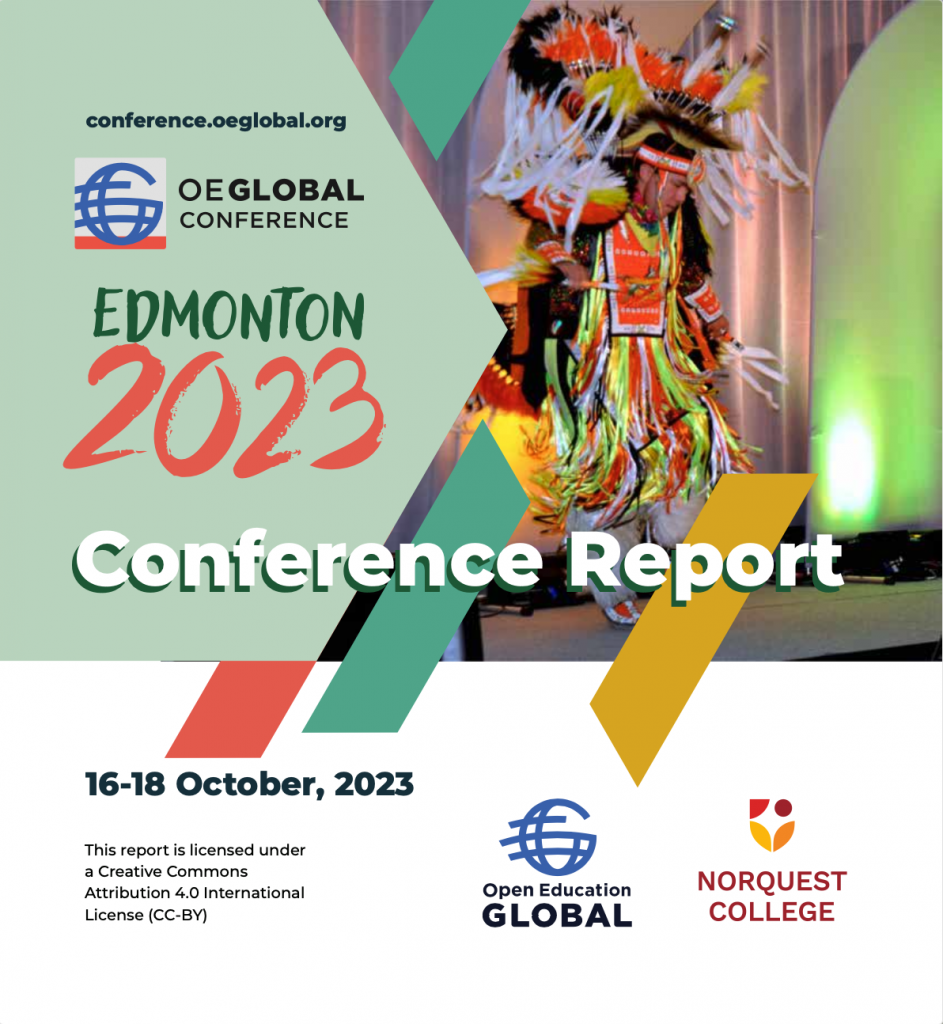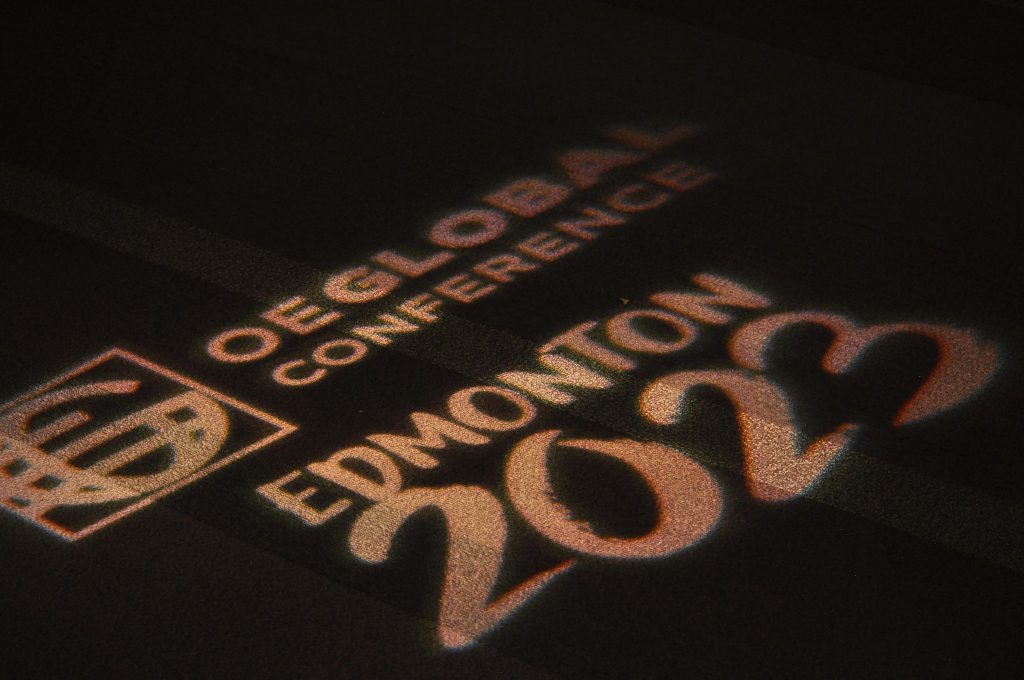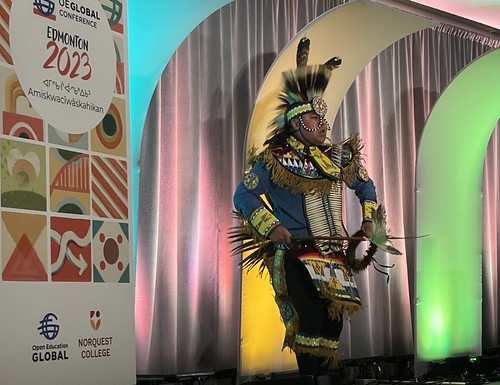OEGlobal 2023 in Edmonton / Amiskwacîwâskahikan, Canada, took place in October 2023. It feels like it ended just yesterday. There has been so much to digest and process from an exceptional conference.
We want to thank each of the 418 attendees who could be in Edmonton, making OEGlobal 2023 the success it was! We’d also like to thank the global open education community for their unwavering support and interaction through OEG Connect and the 441 viewers of the live-streamed sessions.
As with all things in Open, it is the community and those who participate that make it as successful as it can be – with this in mind, below, we have shared the impressions of those who attended. Thank you to all 110 survey respondents for sharing your experiences!
From the beginning, the conference theme concentrated on Building a Sustainable World through Open Education. This starting premise was further expanded to Two-Eyed Seeing and Braiding through the program vision of the program chairs, Connie, Darrion, Dawn, and Robert – thank you!
There was an overwhelmingly positive response from attendees (99% of survey respondents) who enjoyed the diversity of the four keynotes.
“The keynotes were so mind-expanding, and the effortless and respectable weaving of indigenous culture and wisdom was inspirational.”
“Darrion Letendre’s keynote on two-eyed seeing really set the tone for the conference. His words encouraged me to think of what I have to share with others and made me less nervous for my own presentation.”
“Both Kayla and Cable’s keynotes were inspiring. Their words resonated with many issues we are collectively grappling with locally and more broadly.”
Attendees felt inspired by the program chair’s vision of two-eyed seeing and braiding (87% of survey respondents) and their dedication to weaving indigenous knowledge and culture into the conference (88% of survey respondents).
“[OEGlobal 2023 was] the best experience I have ever had related to indigenous way of knowing.”
“I appreciated the intentionality with which Indigenous knowledge was uplifted and discussed within the context of this conference. I look forward to more work being done in this area.”
“I felt so embodied. This RARELY happens in academic spaces, and I am grateful to the program organizers for being so thoughtful.”
“Darrion [Letendre] said this in his keynote. How two-eyed seeing and braiding can bring us to see the gift of multiple perspectives, that all perspectives are equally valuable and indeed necessary as we move forward together.”
“OEGlobal 2023 Talking Circle was the deepest and most profound session. Also enjoyed day 0 and the braiding two-eyed seeing elements and overall positioning of indigenous ways of knowing, especially in the context of sustainability. It was wonderful to see people in person and reforge connection.”
The conference’s positioning in North America allowed for a very high number of first-time attendees at 72% of the 418 attendees.
“I came as a newcomer who was feeling shy and worried about how to engage. Within the first keynote speaker event, I instantly felt welcomed into new ways of seeing and an inclusive community that opened the door for me to enter. Mahalo. I am so grateful to feel a sense of belonging.”
“As I am a newcomer to this conference, I did not expect to feel so instantly connected. I hope to be able to participate for years to come. It would be vital to my success at my institution. I thank you for your sharing and welcoming.”
“I didn’t expect to feel so encouraged. The keynotes and organizers made it such a beautiful and inclusive space. Thank you for that.”
“As someone new to the field of OER, I really enjoyed learning from so many global experts. To have access to this conference, in our own province is amazing. Thank you. I also really appreciated the conversations and themes around Indigenous knowledge sharing and the complexities of this work.”
Most people attended the conference with the expectations of:
- renewing and making new professional relationships,
- learning about new research and open education projects,
- seeking inspiration to implement open education practices, and
- sharing their open education work with colleagues.
“This isn’t like most conferences – these speakers are bringing theory and application all at once!”
“I haven’t seen some colleagues since 2017/18, and some international colleagues I have only otherwise connected with them online. It is difficult to describe the joy of re/connecting in person with others who are part of this global movement”
“Experiencing Sarah Lamouche’s storytelling and hoop dancing was a joy, as were so many sessions where colleagues reported the many ways in which they’re improving education through open education work.:
“I had opportunities to meet with colleagues with whom I’ve remotely worked for YEARS, so being able to meet them in person has been surreal and amazing.”
“It was inspiring when I met colleagues who have the same questions as me but who practice different answers… when I exchanged points of view with people from different contexts but who agree on ways of acting or thinking… in short, not only inspiring but, more than anything, enriching.”
A conference is always an exclusive event – with many people being unable to attend. We were grateful that we could livestream two rooms, ending up with 43 sessions being recorded and watched live by 441 individuals.
“One key takeaway is how much incredible effort is being made by the conference team to embrace and welcome remote participants, whether by live stream, chat, OEG Connect, etc., to share keynotes, sessions, and the feeling of actually being there. Good one, with thanks.”
A conference of this magnitude and importance is only possible due to the incredible co-hosting team from NorQuest College. Thank you, conference organisers Patti, Sarah, and Sheldon, for all the exceptional logistics and support. And to the NorQuest students in the Red Vests who reminded us daily of the true purpose of attending the conference!
“The welcoming approach of the conference organisers, facilitating all activities to flow smoothly thanks also to the presence of students, very much appreciated!!!”
We’re extremely grateful to our 16 partners and sponsors who supported the event, and we look forward to seeing you in Brisbane for OE Global 2024.
OEGlobal 2023 in a nutshell
You can find below a few statistics about the in-person conference. Click on the image to read the full report.
- 3 days (+ 1 pre-conference social event)
- 418 delegates
- 72 % were first-time attendees
- 13% were students
- 44% were OEGlobal members
- 29 countries represented
- 195 attending presenters
- 233 proposed talks submitted
- 187 sessions scheduled, including
- 3 OEG Live broadcasts
- 3 social events
- 4 Inspiring keynotes
- 16 Lightning Talks
- 28 Action Labs
- 12 Panels
- 99 presentations
- 6 wildcards
- 43 livestream sessions
- 441 unique viewers
- 3,619 live streams loaded
- 16 partners and sponsors

OEGlobal 2023 is always alive online!
- Presenter materials are on Sched https://oeglobal2023.sched.com/
- Where Are your OEGlobal 2023 photos? Ours are on Flickr!
- Share your blog posts and news stories!
- Read this one from the CCCOER Executive Council
- Listen to the OEG Voices’ Sounds of OEGlobal 2023.
- Remix an OEGlobal 2023 postcard.
- Did you miss a session? Watch it here!
- All the recorded sessions on our YouTube Playlist
- All the Keynotes on a dedicated playlist
- View the Contributions from NorQuest Students
Share Your Experience in OEG Connect
Was your experience reflected above? We’d love to hear your views and experiences!


